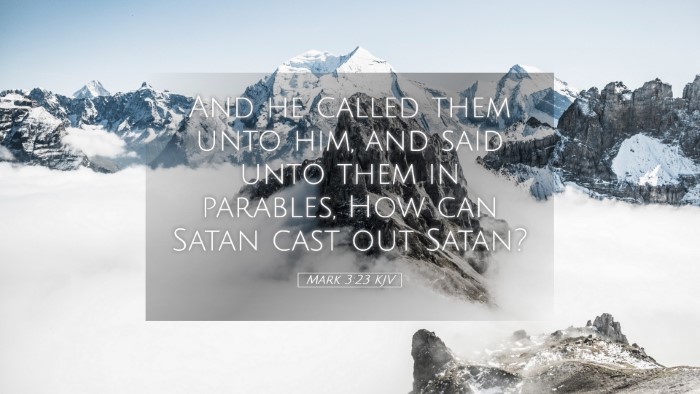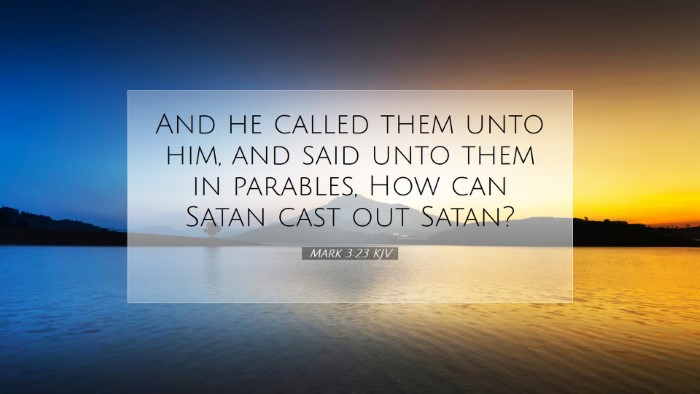Commentary on Mark 3:23
Verse Reference: Mark 3:23 "And he called them unto him, and said unto them in parables, How can Satan cast out Satan?"
Introduction
The Gospel of Mark presents a vivid account of Jesus' ministry, focusing on His authority and the misunderstanding that often surrounded Him. In Mark 3:23, Jesus poses a rhetorical question that unveils the illogical nature of the accusations against Him. Combining insights from various public domain commentaries, we explore the implications of this verse as they pertain to understanding the Kingdom of God and the nature of opposition faced by Jesus.
Contextual Analysis
This verse comes in the midst of an escalating conflict between Jesus and the religious authorities of His time. After performing miracles and healing on the Sabbath, Jesus draws criticism from the Pharisees, who accuse Him of being in league with Beelzebub, the prince of demons. Here, Jesus takes the opportunity to clarify the absurdity of their accusations.
Matthew Henry's Perspective
Matthew Henry notes that this passage reveals the malicious spirit of the Pharisees. They, blinded by jealousy and pride, resort to ridiculous claims to undermine Jesus' authority. Henry emphasizes that Jesus’ question ingeniously illustrates the division that exists within the realm of evil; if Satan were to cast out his own forces, it would lead to chaos, thereby working against his own interests.
Albert Barnes' Insights
Albert Barnes points out that Jesus often spoke in parables to provoke thought and reflection. By asking, “How can Satan cast out Satan?” Jesus highlights the self-destructive nature of division within evil forces. Barnes elaborates on the concept that a kingdom divided against itself cannot stand (Mark 3:24), establishing the rationale of societal harmony and coherence even amongst the forces of darkness.
Adam Clarke's Commentary
Adam Clarke further delves into the implications of this statement, illustrating that the exercise of demonic power is inherently against the nature of God's kingdom. He posits that for Satan to give up his own forces would be tantamount to abandoning his dominion. Clarke succinctly states that this rhetorical question serves not only to defend Jesus' actions but also to make a broader theological point about the nature of spiritual warfare.
Theological Implications
In addition to its immediate context, Mark 3:23 holds profound theological implications. The statement underscores the essence of unity both in good and evil. Jesus asserts that His mission is to overthrow Satan's stronghold, drawing a clear line between divine authority and the realm of darkness.
- The Authority of Jesus: As Jesus presents this argument, He simultaneously affirms His authority over demonic forces. His miracles are not acts of collusion with evil but rather manifestations of His divine power.
- Understanding of Evil: The verse challenges believers to reconsider the nature of evil in the world. As Clarke notes, a better understanding of the internal dynamics within the 'kingdom of darkness' enhances our comprehension of the struggles faced in spiritual warfare.
- Unity and Division: Barnes highlights the principle of unity that is necessary for any kingdom or authority to thrive, pointing to the importance of collective effort within the body of Christ, thereby reinforcing the idea that division only serves to weaken.
Applications for Today
For pastors, students, theologians, and Bible scholars, Mark 3:23 serves as a reminder of the necessity of discernment in spiritual matters. In a world rife with division and confusion, Christians are called to identify and counter the tactics of the enemy with clarity and sound doctrine.
- Defending the Faith: Just as Jesus defended His ministry against false accusations, believers today must be equipped to articulate their faith and the truth of the Gospel against contemporary critiques.
- Promoting Unity: The challenge posed by this verse is not just to counter falsehoods but to actively promote unity within the Church, reflecting the cohesive nature of God’s Kingdom.
- Engaging with Spiritual Warfare: Understanding that spiritual opposition is a reality, this passage encourages a proactive stance in prayer and action against forces that seek to thwart God’s work.
Conclusion
In summary, Mark 3:23 offers profound insight into the nature of Jesus’ ministry and the opposition He faced. The teachings of Matthew Henry, Albert Barnes, and Adam Clarke converge on the themes of authority, unity, and the realities of spiritual conflict. As believers reflect on this verse, they are reminded of the power of Christ over evil and the call to live in coherence with the Gospel, fostering unity and embodying the truth in a divided world.


